Prisoners without committing any crimes
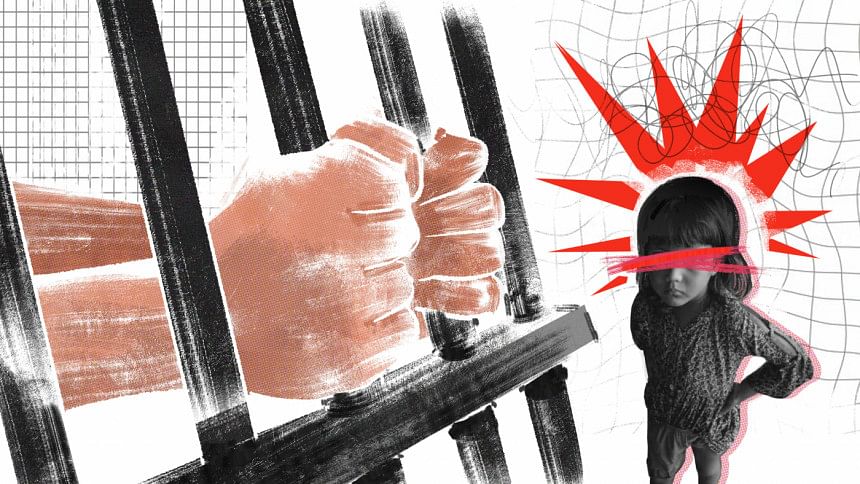
Recently, the High Court, in response to a writ petition, asked the government to explain why laws would not be framed for the mental and psychological development of children detained with their incarcerated mothers in jails across Bangladesh. The public interest litigation came after a local daily highlighted the plight of 10-month-old Mahida, who lives with her imprisoned mother Husna Akhter in a condemned cell in Habiganj jail. Mahida is one of 304 children detained in 68 jails around the country.
Mahida shares a cramped cell, measuring 10 feet by 10 feet, with her mother and two others, has no access to a window and lives under a high-power electric light that stays on all night. The four of them survive on one bucket of water a day, and hence, there is no way for her to have clean nappies. The sufferings of Mahida point to a legal lacuna and a procedural dead end, as the regulations for children of incarcerated mothers in Bangladesh are inadequate and/or not being implemented.
Both our legal system and societal outlook towards offenders are based on punishment rather than rehabilitation. Due to our internal ethical conflict, it is naturally difficult for us to comprehend that a prisoner is also deserving of a respectable life, rather than one of condemnation and shame. It is not easy to imagine a life for Husna Akhter other than one of endless torture, as a consequence of what she inflicted on her sister-in-law. By association, we also cannot find it within ourselves to care for her 10-month-old child, whose fate is indispensably tied to that of her mother's.
Bangladesh has ratified the UN Convention on the Rights of the Child (CRC), which is the primary human rights treaty outlining the civil, political, economic, social, health and cultural rights of children. CRC necessitates all signatories to take all available measures to ensure the protection of children's rights, which ranges from formulating and implementing policies to allocating funds for advancing children's well-being. The revelation of an astounding 304 innocent children being detained in jail, effectively suffering the same fate as a convicted offender, is in utter stark contrast with such commitment of the state.
In its preamble, Children Act, 2013 states that the premise of this law is rooted in the CRC. The substantial piece of legislation covers many aspects of juvenile justice and children coming in contact with the law, but it largely fails to cover wellbeing of children of incarcerated mothers. Mahida's mother Husna was sentenced to death along with four members of her family, after being convicted of torturing and killing her sister-in-law for dowry. The case was reportedly filed in 2016 and the accused were finally sentenced in October last year. Mahida was with her mother at the time of her sentencing, and as a baby fully dependent on her mother, had to go to the condemned cell with her.
As per section 89(1)(e) of the Children Act, 2013, "disadvantaged children" include children dependent on imprisoned parents or children living in prison with the imprisoned mother. Section 89(2) further goes on to stipulate that the government may take measures to ensure special protection, care and development of disadvantaged children. The act arguably has kept a number of provisions through which disadvantaged children like Mahida can be brought under the care of the Department of Social Welfare. However, in absence of rules, the implementation of this act has been difficult and riddled with ambiguity. The data speaks for itself. If the provisions were being implemented, a staggering number of children would not be detained in inhumane circumstances in our jails.
These children do not exist in isolation. Every day, their presence comes to the notice (or they should) of a number of people who comprise the justice system, including prison officials and police. It is hard to believe that none of them have the influence to take this issue to the next chair in command, and if they have done so, it is heartbreaking, disappointing and downright alarming to comprehend that those in power do not care enough to give these children a chance to live a dignified life.
Both our legal system and societal outlook towards offenders are based on punishment rather than rehabilitation. Due to our internal ethical conflict, it is naturally difficult for us to comprehend that a prisoner is also deserving of a respectable life, rather than one of condemnation and shame. It is not easy to imagine a life for Husna Akhter other than one of endless torture, as a consequence of what she inflicted on her sister-in-law. By association, we also cannot find it within ourselves to care for her 10-month-old child, whose fate is indispensably tied to that of her mother's. Besides, with the population at large struggling to make ends meet due to skyrocketing inflation, a prisoner's right to a dignified life is definitely an afterthought.
The environment of a condemned cell, where prisoners wait for their death sentence to be executed, is in no way, shape or form remotely ideal to raise a baby. We are not talking about her right to education or healthcare or freedom of expression; we must comprehend and register the fact that this child's days pass in a closed room without windows. Her close family members are on death row, and this cell is the only reality she will know unless the state fulfils its duty to care for her.
Admittedly, it would take a lot of persuasion to convince ourselves that convicted prisoners deserve humane treatment. However, when innocent children are entangled in this process, the state must refocus and find a balance to protect their right to a safe and dignified life. Our government prides itself on enhancing children's rights on various fronts, from healthcare to education. Regardless of how well those development efforts have translated in practice, it is upsetting that a large number of our country's children are living in inconceivably degrading situations, fully left out of even the most fundamental rights despite committing no wrongs themselves. As pointed out, some forms of laws do exist in this regard, and if they are not being implemented, it is due to a lack of political goodwill. As a nation, we are overdue for an overhaul of our prison system, and perhaps a change in cultural outlook in how we treat people coming in contact with the law. Ethically, it is certainly a difficult ask, but it is a natural step towards creating a more human-rights conscious society.
Anupoma Joyeeta Joyee is a barrister-at-law. Email: [email protected]
Views expressed in this article are the author's own.
Follow The Daily Star Opinion on Facebook for the latest opinions, commentaries and analyses by experts and professionals. To contribute your article or letter to The Daily Star Opinion, see our guidelines for submission.

 For all latest news, follow The Daily Star's Google News channel.
For all latest news, follow The Daily Star's Google News channel. 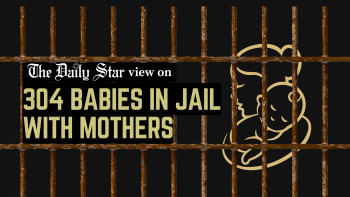
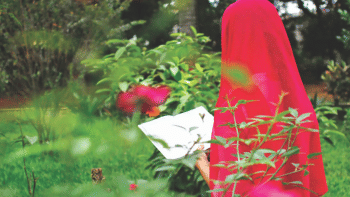
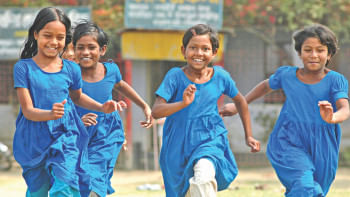


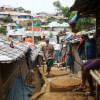





Comments